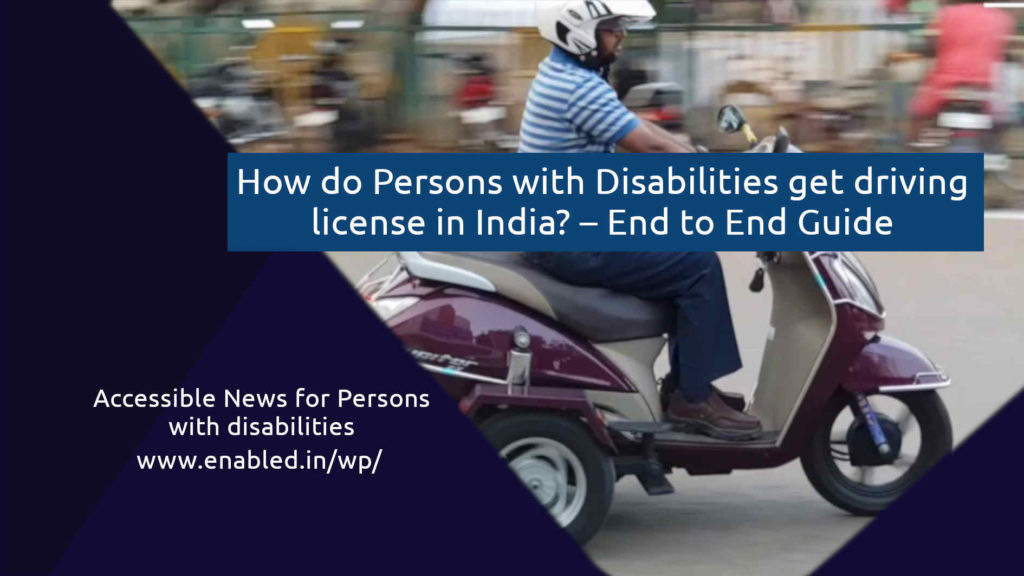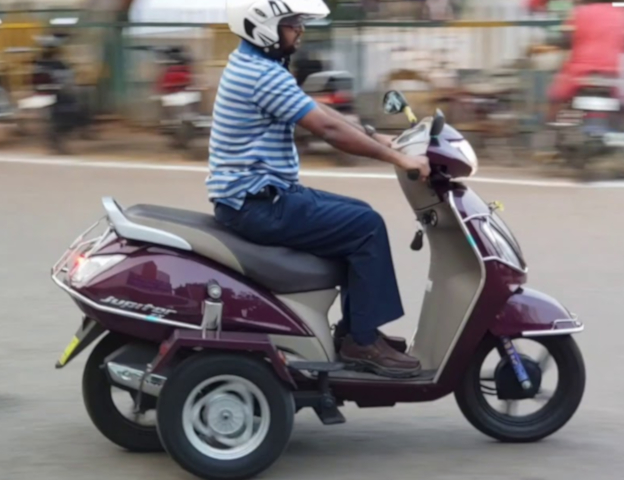


The ability to drive is more important for persons with disabilities than any one else. The rules and their awareness are only recently being clarified due to many Government Orders. So below we will furnish all the details for a persons with disabilities person to own and drive a two wheeler or car.
Table of Content
Fitment of Side Car:
Fitment of additional two wheels at the rear on both the side:
The kit manufacturer shall identify the workshops, which shall carry out the fitment on his behalf. This shall be done on the basis of:
| Nature of limb disability | Recommendation | Remarks |
| Left lower limb (partial or full) | Can be considered | — |
| Right lower limb (partial or full) | Can be considered | — |
| Both lower limb (partial or full) | Can be considered | — |
| Left / Right upper limbs (partial or full) | Can be considered | — |
| Both upper limb (partial) | Can be considered under special circumstances | Normal operation by hands is very critical. Such situations may be considered under special circumstances |
| Combination of one lower limb and upper limb. | Can be considered under special circumstances | — |
Medical Certificate for the purpose of DL would be given at the District level by a duly constituted board comprising of CMO as chairman, one medicine specialist and one subject matter specialist (PMR / Orthopedics surgeon) as member in District hospitals or by a Medical College, where the board will consist of Medical Superintendent or his authorized representative as chairman and two subject matter specialists (PMR / Orthopedic surgeon) as members.
| Circular / G.O | Downloads |
| Road and Transport (GOI) No.RT-11012/12/01-MVL. 23rd July, 2008 | Guideliness and Procedure(PDF, 1MB) |
| Tamil Nadu No: 22299/k3/2014 Date : 11-08-2014 | Driving licences for all retrofitted / adaptation kit for persons with disabilities (PDF, 2MB) |
| Tamil Nadu Letter No:18390/H3/2010 Date : 22.02.2011 | Motor Vehicles – Tow wheelers already modified before 10.01.2011 – effecting alteration – certain instuctions issues (PDF, 1.3MB) |
| Rajasthan 7(491) – 2013 | 05/2014 Date : 03/02/2014 | Alteration in the cars to facilitate the persons with disabilitiy to drive the same(1.3MB, PDF) |
| Kerala NO: C1/19469/TC/2009 Date : 22-07-2011 | Motor vehicels department approval of retrofitted / adaptation kit for differently abled persons for using in M1 category non transport vehicles – Automotive Research Association of India (PDF, 1.8MB) |
| RTI – R Pushpakumar | Reg: Modified Scooter |
| Step by Step Guide by Ragesh G.R | How do physically disabled people get driving license in India? |
Corresponding Law.– Section 2 (17) corresponds to section 2 (9-A) of the Motor Vehicles Act, 1939.
(18) “invalid carriage” means a motor vehicle specially designed and constructed, and not merely adapted, for the use of a person suffering from some physical defect or disability, and used solely by or for such a person;
Para 8: Grant of learner’s licence : (4) If, from the application or from the medical certificate referred to in subsection (3) it appears that the applicant is suffering from any disease or disability which is likely to cause the driving by him of a motor vehicle of the class which he would be authorised by the learner’s licence applied for to drive to be a source of danger to the public or to the passengers, the licensing authority shall refuse to issue the learner’s licence; Provided that a learner’s licence limited to driving an invalid carriage may be issued to the applicant, if the licensing authority is satisfied that he is fit to drive such a carriage.
(b) that the applicant is not suffering from any disease or disability which is likely to cause the driving by him of a motor cycle or, as the case may be, a light motor vehicle to be a source of danger to the public ; and as the licensing authority may for that purpose require the applicant to produce a medical certificate in the same form and in the same manner as is referred to in sub-section (3) of section 8:
Provided further that where the application is for a driving licence to drive a motor vehicle ( not being a transport vehicle), the licensing authority may exempt the applicant from the test of competence to drive prescribed under this sub-section, if the applicant possesses a driving certificate issued by an automobile association recognised in this behalf by the State Government.”
Para 16 : Revocation of driving licence on grounds of disease or disability.
Notwithstanding anything contained in the foregoing sections, any licensing authority may at any time revoke driving licence or may require, as a condition of continuing to hold such driving licence, the holder thereof to produce a medical certificate in the same form and in the same manner as is referred to in subsection (3) of section 8, if the licensing authority has reasonable grounds to believe that the holder of the driving licence is, by virtue of any disease or disability, unfit to drive a motor vehicle and where the authority revoking a driving licence is not the authority which issued the same, it shall intimate the fact of revocation to the authority which issued that licence.
Corresponding Law. – Section 16 corresponds to section 12 of the Motor Vehicles Act, 1939.
Objects and Reasons. – Clause 16 seeks to empower the licensing authorities to revoke the driving licences if the holder of driving licence is found medically unfit to drive by virtue of any disease or disability.
Para 32 : Revocation of a conductor’s licence on grounds of disease or disability.
A conductor’s licence may at any time be revoked by any licensing
authority if that authority has reasonable grounds to believe that the hold of the licence is suffering from any disease or disability which is likely to render him permanently unfit to hold such a licence and where the authority revoking a conductor’s licence is not the authority which issued the same, it shall intimate the fact of such revocation to the authority which issued that licence :
Provided that before revoking any licence, the licensing authority shall give the person holding such licence a reasonable opportunity of being heard.
Corresponding Law. – Section 32 corresponds to section 21-D of the Motor Vehicles Act, 1939.
Objects and Reasons. – Clause 32 corresponds to clause 16.
Para 9: ‘(1) “adapted vehicle” means a motor vehicle either specially designed and constructed, or to which alterations have been made under sub-section (2) of section 52, for the use of a person suffering from any physical defect or disability, and used solely by or for such person;
Para 25 : The Committee agrees with the provision of this Clause to replace the words invalid carriage with adapted vehicle. Because people who are suffering from physical disabilities may like to have their vehicle modified which may suit to their requirements.
Para 80 : Clause 20 seeks to amend section 52 of the principal Act to allow owners to alter or retrofit equipment to their motor vehicle and provides that the warranty granted by the manufacturer shall not be declared void when such alteration or retrofitment is done in accordance with specifications laid down by the Central Government. It also empowers the Central Government to require manufacturers to retrofit safety and emissions control equipment on motor vehicles. It also seeks to enable the conversion of a motor vehicle into an adapted vehicle for use by persons with disabilities.
Para 173 : As per available data, during the year 2015, approximately 1.5 lakh people died in the road accidents all over the country and around 5 lakh people got injured or disabled. The Committee notes that it is an alarming situation and a huge loss to the nation. The Stakeholders such as the Governments of the Centre and the State, road users, various governmental agencies etc. have to play their role in a positive way to minimize the road accidents
Para 188: The Ministry has submitted to the Committee that Motor Vehicle third Party Insurance Liability cover is a statutory requirement under the Motor Vehicles Act, 1988. The Policy does not provide any direct benefit to the insured but covers the liabilities of the insured against damages arising from death/disability of third party loss or damage to third party property. As per the Insurance Information Bureau (IIB) data, approximately 94% of the claims are up to Rs.7.5 lakhs and that 96.13% are for less than Rs.10 lakhs. A perusal of the number of claims paid by the private sector as well as Government sector insurance companies shows that during the last 4 years (2011-12 to 2014-15), claims in 93% to 97% of the death and grievous hurt cases were below Rs.10 lakhs (Source IIB). In the case of grievously hurt during the last five years, almost 90% of the numbers of claims were up to Rs.5 lakhs. (as per IIB).
Para 301: the word “disabled” shall be omitted;